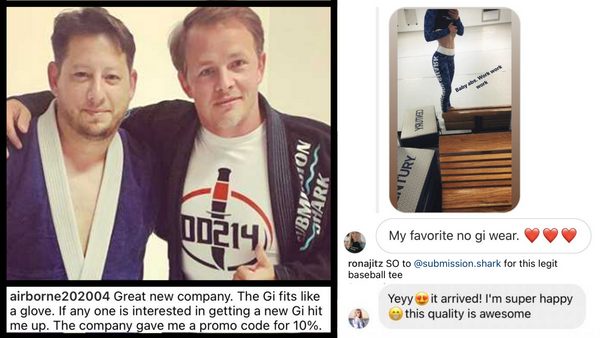BJJ Beginners: When To Start Competing and What to Expect
So you've been training Brazilian Jiu-Jitsu for a while and feel like you're ready to start competing? Competing can be a great way to test your skills, meet new people, and see how you stack up against other BJJ practitioners.
In this blog post, we will discuss when to start competing and what you can expect from your first competition experience. Let's get started!
When to Start Competing

The best time to start competing in BJJ depends on your experience and skill level. If you are a beginner, it is recommended that you wait until you have been training for at least six months to a year. This will give you enough time to learn the basic techniques and drills of BJJ and also develop some basic skills and stamina.

However, if you are an experienced practitioner with a few years of training under your belt, then you may be ready to compete sooner. Just make sure that you are familiar with the competition rules and regulations before entering into your first tournament.
What to Expect from Your First Competition Experience
Your first competition experience can be both exciting and nerve-wracking at the same time. Here are some of the things you can expect:
- Increased intensity in training: When you start competing, your teammates and training partners will likely step up their game and push you harder in order to prepare you for tournaments. This can be a good thing, as it will help you to develop greater stamina and skills. However, it can also be overwhelming if you're not used to such a high level of intensity.
- Greater focus on technique: In competition, there is no room for mistakes. As a result, practitioners tend to focus more on proper technique and drilling during training sessions. If you're looking to improve your BJJ skills, competing is a great way to do so.
- Higher chance of injury: Although BJJ is a relatively safe martial art, there is always the risk of getting injured during training or competition. Make sure that you are aware of the risks and take the necessary precautions to reduce your chances of getting injured.
- Competition nerves: Even experienced competitors can feel nervous before a tournament. This is perfectly normal and usually goes away once the matches start. Just make sure that you stay calm and focused on your goals.
Competing in Brazilian Jiu-Jitsu can be a rewarding experience for both beginners and experienced practitioners alike. Just make sure that you are prepared for what to expect, train hard, and have fun!

Can you compete as a BJJ white belt?
Yes, you can compete as a BJJ white belt. However, you will likely be matched up against opponents who have more experience than you. This can be a great way to learn and get feedback on your techniques, but make sure that you don't get discouraged if you lose your matches. Just keep training hard and focus on improving your skills.
Can you start competing when you just started BJJ?
When starting out in Brazilian Jiu-Jitsu (BJJ), it is best to wait until having been training for around six months to a year. Competing sooner is possible for those with previous martial arts experience or if knowledgeable about the competition rules/regulation - just be aware there is always an increased risk of injury during martial arts competitions overall.
Your first competition experience can be nerve-wracking yet exciting. As a beginner, you can expect to see an increase in the intensity of training from your teammates and peers; many will want you to be ready for upcoming tournaments.
Timing and Rounds
There is also usually a greater focus on technique when preparing for competitions - this is because any mistake made under pressure could result in a loss.
You also may be encouraged to push the pace and look for dominant positions during your bjj training because almost all jiu jitsu tournaments are time limited by rounds. If you are behind in points, it's important to know how to pass guard to gain points or sweep into a submission such as a guillotine choke.
Competing regularly increases the chance of sustaining injuries too, so make sure that if intending to compete frequently, precautions are taken seriously beforehand.
Can you use other martial arts moves at match?
Jiu Jitsu athletes can have previous experience in other grappling combat sports and ground fighting such as wrestling and judo. These moves are often allowed but is best to learn the full rule list that each organization has for their brand.
Local Tournaments

The BJJ community is often welcoming to new students who want to learn BJJ on a deeper level through competition and will often have a local tournament where practitioners can put together all the tools they've learned in their self defense class into a more competitive environment.
Many jiu jitsu practitioners may not have ambitions to win a championship and that is okay.
However, just going to a different gym, whether you are there to face an opponent on the mat or simply to be a more engaged participant in the BJJ world, local events are great for all practitioners from white belts to experts like Nick Rodriguez and Craig Jones.
Managing Your Nerves
It's not uncommon for those experienced in competing to feel nerves before tournaments start but remember: it takes most people time to adjust and perform at their best. All said and done, BJJ competitions can offer valuable experiences for beginners and experienced practitioners alike!
Will Training Change For Competitions?
As a beginner, you can expect to see an increase in the intensity of training from your teammates and peers; many will want you to be ready for upcoming tournaments.
Competing regularly increases the chance of sustaining injuries too, so make sure that if intending to compete frequently, precautions are taken seriously beforehand.
Example of a competitive jiu jitsu training session
If you feel like you need more practice in a specific jiu jitsu position, do not hesitate to speak up as BJJ beginners will inevitably have some weaknesses.

A head instructor may let BJJ practitioners play starting from bad positions such as side control or open guard to let students focus on specific aspects of jiu jitsu during a class.
In a match, it is different as you stand to start, meaning it can be helpful to learn takedowns, sprawls and judo trips / throws to transition from standing to fighting with grappling on the mat.
Another competitive jiu jitsu training method that BJJ beginners may not be familiar with is the 'Shark Tank'.

This is where a jiu jitsu practitioner will roll / spar with no breaks for multiple rounds, with a 'fresh' training partner filling in after each round. This simulates an opponent that never gets tired while you are consistently getting more tired with each round.
The 'Shark Tank' helps build cardio but also helps to gain experience under pressure as the main focus of the jiu jitsu session is on them.
All said and done, BJJ competitions can offer valuable experiences for beginners and experienced practitioners alike! Compete safe, train hard and have fun!
What Is Fight / Competition Team in BJJ?
A fight or competition team is a group of Brazilian Jiu-Jitsu practitioners who train together specifically for fighting and competing. This type of training usually involves more live sparring (resisting) and drilling with resistance than what would be found in a traditional BJJ academy.
If you're interested in competing, joining a fight or competition team can be a great way to improve your skills quickly. Just make sure that you are aware of the risks involved and take the necessary precautions.
The fight team is where practice is taken more seriously as there are other people looking to become the best they can, whether it is through a specific grappling sport like wrestling, judo, jiu jitsu or MMA.
Ambitions to become world class in a sport can be seen here and mat time is precious. It's important to respect your training partners goals.
How much does a BJJ tournament cost?

The cost of a BJJ tournament can vary depending on the location, organization and type of event. Generally speaking, most tournaments will charge an entrance fee (ranging from $20 - $60) as well as a spectator fee (usually $15 or less).
Some competitions may also offer prize money for the winners, which can range anywhere from a few hundred dollars to several thousand. It's important to research upcoming tournaments in your area to get a better idea of how much they'll cost.

If you are in a bad position and cannot find extra funds after paying for your grappling class, you can try to seek sponsorship opportunities.
How long does it usually take someone to adjust to competing?
It's not uncommon for those experienced in competing to feel nerves before tournaments start but remember: it takes most people time to adjust and perform at their best. All said and done, BJJ competitions can offer valuable experiences for beginners and experienced practitioners alike! Compete safe, train hard and have fun!
What are some of the risks associated with competing?
As mentioned earlier, one of the main risks associated with competing is sustaining injuries. This is especially true for those who compete frequently.
Another risk factor is that many tournaments involve grappling on the ground - a position where it's easy to be submitted. Therefore, inexperienced competitors can easily find themselves in dangerous positions if they're not careful.
It's important to remember that Brazilian Jiu-Jitsu is a martial art and should be treated as such when attending tournaments. Be respectful towards your opponents and referees, and always compete safely.

What are some common mistakes that beginners make when competing?
One of the most common mistakes that beginners make when competing is not being aware of their own strengths and weaknesses.
Another mistake is trying to do too much - many beginners try to win every match by using complicated techniques, which usually doesn't work. Instead, focus on playing your game and use simple techniques that you're comfortable with.
Finally, don't forget to have fun! Competing can be a great experience but it's important not to take things too seriously.
What should I wear to a BJJ tournament?
The appropriate attire for a BJJ tournament will vary depending on the organization hosting the event. However, in most cases, competitors will need to wear a gi (uniform) and a belt.
It's important to check the rules of the tournament beforehand to make sure that you're dressed appropriately.
What should I expect at my first BJJ tournament?
Your first Brazilian Jiu-Jitsu tournament can be an exciting but nerve-wracking experience. Here are some things you can expect:
- You'll likely have to weigh in before the competition begins. Make sure you're aware of the weight requirements well in advance.
- You'll be given a specific match time and location prior to the start of the event.
- When your match begins, both fighters will shake hands and bow to each other.
- The match will be overseen by a referee who will make sure that all competitors abide by the rules.
- Matches usually last between three and five minutes, depending on the age and weight division of the fighters.
After your match is complete, both fighters will shake hands once again and return to their respective corners. Be sure to watch the rest of the competition - it can be an informative experience!
What should I do if I lose my first BJJ tournament?
Losing your first Brazilian Jiu-Jitsu tournament can be a discouraging experience but it's important to remember that everyone has to start somewhere.

Instead of feeling discouraged, use the loss as motivation to train harder and improve your skills. There's no shame in losing - it's how you respond to setbacks that determines your success.
What should I do if I win my first BJJ tournament?
Winning your first Brazilian Jiu-Jitsu tournament can be an exhilarating experience.
As with any victory, it's important to stay humble and remember that there's always room for improvement. Celebrate the win but don't let it go to your head - continue training hard and chasing new goals. Congratulations on a job well done!

Competing is one of the best ways to test yourself and see how far you've come in your BJJ journey. While some beginners may feel apprehensive about competing, it's important to remember that competing is a learning experience. You'll face opponents of all levels and learn new techniques along the way.
Do you have to compete as a BJJ Practitioner?
No, you don't have to compete as a BJJ practitioner. However, competing can be a great way to test your skills and see how far you've come. Competing also provides an opportunity to meet new people and learn from other practitioners.
When is the best time to start competing in BJJ?
The best time to start competing in Brazilian Jiu-Jitsu depends on your level of experience and training schedule. It's best to ask your instructor for his or her opinion and if you are ready.

Benefits of Competing In BJJ Tournaments
- Competing in BJJ can help increase stamina and skill.
- When starting out in BJJ, it is best to wait until having been training for around six months to a year.
- Your first competition experience can be nerve-wracking yet exciting. As a beginner, you can expect to see an increase in the intensity of training from your teammates and peers; many will want you to be ready for upcoming tournaments.
- There is also usually a greater focus on technique when preparing for competitions. This is because any mistake made under pressure could result in a loss.
- Competing regularly increases the chance of sustaining injuries too, so make sure that if intending to compete frequently, precautions are taken seriously beforehand.
- nerves before tournaments start but remember: it takes most people time to adjust and perform at their best. Compete safely, train hard and have fun. Thanks for reading!
What does good sportsmanship look like in BJJ tournaments?
Good sportsmanship is key in any martial art, and Brazilian Jiu-Jitsu tournaments are no different.
Sportsmanlike behavior includes shaking your opponent's hand before and after the match, as well as abiding by the referee's decisions. Cheating or unsportsmanlike conduct will not be tolerated - violators can be disqualified from the tournament.
Shake your opponent's hand before and after the match. Abide by the referee's decisions. Compete safely, train hard and have fun!
Competing is one of the best ways to test yourself and see how far you've come in your BJJ journey. While some beginners may feel apprehensive about competing, it's important to remember that competing is a learning experience. You'll face opponents of all levels and learn new techniques along the way.
What should I eat on competition day?
On competition day, it's important to eat a balanced meal that will give you energy without making you feel weighed down.

Avoid eating high-fat foods or anything that is difficult to digest. Some good options include fruits, vegetables, lean protein sources, and water.
It's best to have your ideal nutrition for performance ready so you know exactly what to eat and when to eat as well.
Practice Makes Perfect
Having a 'test' competition day where you have intense sparring rounds to simulate competitions prior to the actual event can help you adjust your diet to your optimal performance.
Learn more about BJJ nutrition in this in depth guide. It is also helpful to consult a licensed and trained medical health care practitioner as Submission Shark does not give medical advice.
Ranks and Sandbagging

BJJ events are often segmented by ranks to help keep things fair. This is so that you don't get a black belt competing with a purple belt.
Sandbagging is a term used for when coaches and teams delay promotion of an athlete until after a series of competitions to help them gain an advantage.
The meaning of this is that if you are going against an opponent that is sandbagging, you will most likely end up in a bad position.
Jiu jitsu requires a lot of trust on all levels and it is up to the event organizers and coaches to honor the system honestly if they wish to maintain a world class reputation.
Summary
If you're thinking about competing, here are some things to keep in mind:
- Competing can be nerve-wracking but it's also a lot of fun. Remember to enjoy yourself!
- You can learn a lot about yourself from and a good opponent in the BJJ world, you don't have to be in the UFC to experience life changing benefits.
- BJJ beginners can start competing against an opponent within the first few months.
- You can compete in no-gi, gi and even MMA if your instructor believes you are ready. These can be steps towards a bigger goal such as the UFC, although that is not required to participate in the BJJ world.
- BJJ tournaments have different weight classes and age divisions.
- When signing up for a BJJ competition, be sure to look at the weight class you will compete in and make sure you are within the limits.
- Most competitions also have different age divisions so that people of all ages can participate.
- Start by competing at local tournaments. These events are usually smaller and more relaxed than larger competitions.
- Make sure you know the rules of the tournament before participating. There's nothing worse than being disqualified because you didn't follow the rules.
- Be respectful towards your opponents and referees - Brazilian Jiu-Jitsu is a martial art after all!
- If you're feeling nervous, remember to take things one step at a time. Competing can be a daunting experience but with the right attitude, anything is possible.
- Don't try to learn too many new techniques before competing. It's important to compete when you feel comfortable and confident with the techniques you know.
- Trying new techniques in a high-pressure situation often doesn't work. Instead, focus on playing your game and use simple techniques that you're comfortable with.
- It can also be a good idea to watch jiu jitsu events with your teammates as BJJ beginners can learn a lot this way as well.
- Finally, don't forget to have fun! Competing can be a great experience but it's important not to take things too seriously.
BJJ beginners competing for the first time may find many benefits, such as learning how to overcome adversity and developing discipline.
Competing attire:
The appropriate attire for a BJJ competition can vary depending on the event. However, most competitions require fighters to wear a rash guard, shorts, no-gi spats or a grappling / BJJ Gi.

It's important to check the specific ruleset of the tournament before participating.

More Resources for BJJ Beginners:
Check out the Submission Shark Jiu Jitsu community to learn more about this sport. It has interviews and stories from BJJ beginners up to black belts experts and every rank in between.































Leave a comment